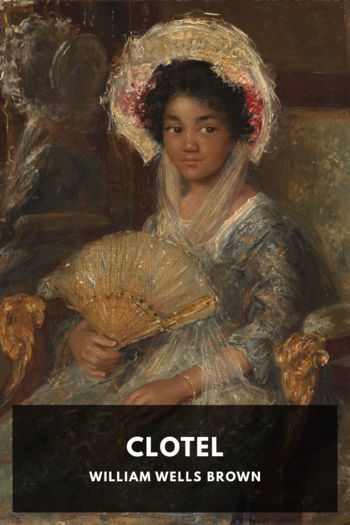Clotel, William Wells Brown [i like reading books .txt] 📗

- Author: William Wells Brown
Book online «Clotel, William Wells Brown [i like reading books .txt] 📗». Author William Wells Brown
The negro, whose home is in a hot climate, was not proof against the disease. Many plantations had to suspend their work for want of slaves to take the places of those carried off by the fever. Henry Morton and wife were among the thirteen thousand swept away by the raging disorder that year. Like too many, Morton had been dealing extensively in lands and stocks; and though apparently in good circumstances, was in reality deeply involved in debt. Althesa, although as white as most white women in a southern clime, was, as we already know, born a slave. By the laws of all the Southern States the children follow the condition of the mother. If the mother is free the children are free; if a slave, they are slaves. Morton was unacquainted with the laws of the land; and although he had married Althesa, it was a marriage which the law did not recognise; and therefore she whom he thought to be his wife was, in fact, nothing more than his slave. What would have been his feelings had he known this, and also known that his two daughters, Ellen and Jane, were his slaves? Yet such was the fact. After the disappearance of the disease with which Henry Morton had so suddenly been removed, his brother went to New Orleans to give what aid he could in settling up the affairs. James Morton, on his arrival in New Orleans, felt proud of his nieces, and promised them a home with his own family in Vermont; little dreaming that his brother had married a slave woman, and that his nieces were slaves. The girls themselves had never heard that their mother had been a slave, and therefore knew nothing of the danger hanging over their heads. An inventory of the property was made out by James Morton, and placed in the hands of the creditors; and the young ladies, with their uncle, were about leaving the city to reside for a few days on the banks of Lake Pontchartrain, where they could enjoy a fresh air that the city could not afford. But just as they were about taking the train, an officer arrested the whole party; the young ladies as slaves, and the uncle upon the charge of attempting to conceal the property of his deceased brother. Morton was overwhelmed with horror at the idea of his nieces being claimed as slaves, and asked for time, that he might save them from such a fate. He even offered to mortgage his little farm in Vermont for the amount which young slave women of their ages would fetch. But the creditors pleaded that they were “an extra article,” and would sell for more than common slaves; and must, therefore, be sold at auction. They were given up, but neither ate nor slept, nor separated from each other, till they were taken into the New Orleans slave market, where they were offered to the highest bidder. There they stood, trembling, blushing, and weeping; compelled to listen to the grossest language, and shrinking from the rude hands that examined the graceful proportions of their beautiful frames.
After a fierce contest between the bidders, the young ladies were sold, one for 2,300 dollars, and the other for 3,000 dollars. We need not add that had those young girls been sold for mere house servants or field hands, they would not have brought one half the sums they did. The fact that they were the granddaughters of Thomas Jefferson, no doubt, increased their value in the market. Here were two of the softer sex, accustomed to the fondest indulgence, surrounded by all the refinements of life, and with all the timidity that such a life could produce, bartered away like cattle in Smithfield market. Ellen, the eldest, was sold to an old gentleman who purchased her, as he said, for a housekeeper. The girl was taken to his residence, nine miles from the city. She soon, however, knew for what purpose she had been bought; and an educated and cultivated mind and taste, which made her see and understand how great was her degradation, now armed her hand with the ready means of death. The morning after her arrival, she was found in her chamber, a corpse. She had taken poison. Jane was purchased by a dashing young man who had just come into the possession of a large fortune. The very appearance of the young Southerner pointed him out as an unprincipled profligate; and the young girl needed no one to tell her of her impending doom. The young maid of fifteen was immediately removed to his country seat, near the junction of the Mississippi river with the sea. This was a most singular spot, remote, in a dense forest spreading over the summit of a cliff that rose abruptly to a great height above the sea; but so grand in its situation, in the desolate sublimity which reigned around, in the reverential murmur of the waves that washed its base, that, though picturesque, it was a forest prison. Here the young lady saw no one, except an old Negress who acted as her servant. The smiles with which the young man met her were indignantly spurned. But she was the property of another, and could hope for justice and mercy only through him.
Jane, though





Comments (0)